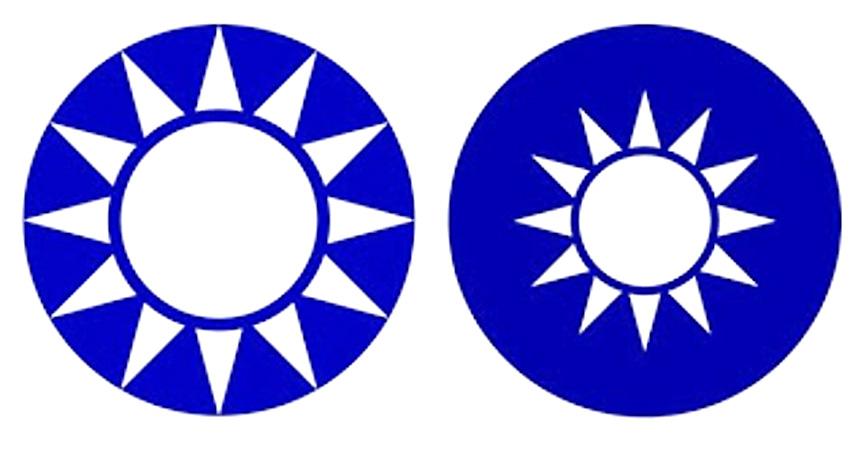Changing the national emblem should not be taken lightly, as it embodies the nation’s collective sentiment, but political party symbols can and should change with the times, the Ministry of the Interior said on Thursday in a report on the issues stemming from similarities between the national and Chinese Nationalist Party (KMT) emblems.
The ministry issued the report in response to a motion raised by the New Power Party caucus and passed on Jan. 29 requesting an evaluation within two months.
Since its installment in 1928, the national emblem has been broadly applied on the national and military flags, medals, uniforms, certificates, foreign embassies and other places, it said.

Photo: Chen Yu-fu, Taipei Times
Changing the emblem would involve difficult legal amendments and considerable expense to redesign all of the aforementioned applications, it said.
The ideological strife it would exacerbate is also a concern, potentially spilling over into the nation’s international dealings, the report added.
The nation went through a long period of authoritarian rule that erased the lines between party and state, but has been lauded the world over for its transition to democracy, earning it the moniker “the beacon of democracy in Asia,” it said.
Although the similarity between the national and KMT emblems is based in history, the national emblem is a symbol of the nation and changing it should not be considered lightly, the ministry said.
On the other hand, the symbols of political parties can and should change to reflect current sentiment, it said.
The party-state era is over and the political arena has become diversified, so political symbols should change to respect the national emblem, it added.
In response, KMT Chairman Johnny Chiang (江啟臣) wrote on Facebook that the suggestion was a deliberate attempt by the Democratic Progressive Party (DPP) to shift the public’s focus from the deadly train accident in Hualien County on Friday last week, claiming the lives of 50 people and injuring more than 200 others.
Taking up the issue is a scheme on the DPP’s part to shift the public’s attention from the tragedy and to dodge its responsibility, which is a disgrace to those who perished in the accident and their families, Chiang said.
He also questioned the DPP’s loyalty to the nation, its flag and the national emblem.
“If the DPP fully identifies with the Republic of China, the KMT will be happy to see it incorporate elements of the national flag and national emblem into its party emblem,” he said.
Deputy Minister of the Interior Chen Tsung-yen (陳宗彥) yesterday said the report only offers an analysis of the current situation and is not a demand for any political party to change their party emblem.

The Grand Hotel Taipei on Saturday confirmed that its information system had been illegally accessed and expressed its deepest apologies for the concern it has caused its customers, adding that the issue is being investigated by the Ministry of Justice Investigation Bureau. The hotel said that on Tuesday last week, it had discovered an external illegal intrusion into its information system. An initial digital forensic investigation confirmed that parts of the system had been accessed, it said, adding that the possibility that some customer data were stolen and leaked could not be ruled out. The actual scope and content of the affected data

DO THEY BITE IT? Cats have better memories than people might think, but their motivation is based entirely around the chance of getting fed Cats can remember the identity of the people who fed them the day before, Taipei-based veterinarians said on Friday, debunking a popular myth that cats have a short memory. If a stray does not recognize the person who fed them the previous day, it is likely because they are not carrying food and the cat has no reason to recognize them, said Wu Chou Animal Hospital head Chen Chen-huan (陳震寰). “When cats come to a human bearing food, it is coming for the food, not the person,” he said. “The food is the key.” Since the cat’s attention is on the food, it

‘LIKE-MINDED PARTNER’: Tako van Popta said it would be inappropriate to delay signing the deal with Taiwan because of China, adding he would promote the issue Canadian senators have stressed Taiwan’s importance for international trade and expressed enthusiasm for ensuring the Taiwan-Canada trade cooperation framework agreement is implemented this year. Representative to Canada Harry Tseng (曾厚仁) in an interview with the Central News Agency (CNA) said he was increasingly uneasy about Ottawa’s delays in signing the agreement, especially as Ottawa has warmed toward Beijing. There are “no negotiations left. Not only [is it] initialed, we have three versions of the text ready: English, French and Mandarin,” Tseng said. “That tells you how close we are to the final signature.” Tseng said that he hoped Canadian Prime Minister Mark Carney

President William Lai (賴清德) yesterday bestowed one of Taiwan’s highest honors on Saint Vincent and the Grenadines (SVG) Ambassador Andrea Clare Bowman in recognition of her contributions to bilateral ties. “By conferring the Order of Brilliant Star with Grand Cordon on Ambassador Bowman today, I want to sincerely thank her, on behalf of the Taiwanese people, for her outstanding contribution to deepening diplomatic ties between Taiwan and SVG,” Lai said at a ceremony held at the Presidential Office in Taipei. He noted that Bowman became SVG’s first ambassador to Taiwan in 2019 and